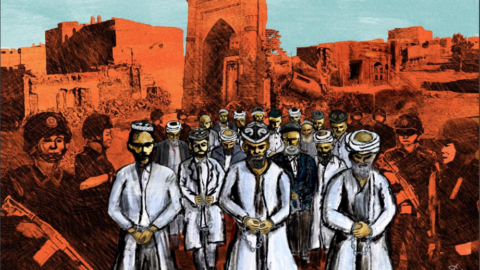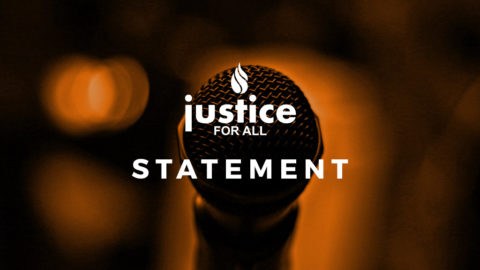Uyghurs and other Turkic peoples in East Turkistan (also known as the Xinjiang Uyghur Autonomous…

On The 40th Anniversary Of The Day Of The Imprisoned Writer: Focus On Indian, Kashmiri & Burmese Prisoners
India:
Under the BJP regime, writers, journalists, and scholars have been arrested for jokes they have not made, social media posts they have made and for traveling to give condolences to a rape victim’s family. A database published by Article 14 highlights that of the 405 cases filed for criticizing politicians and governments over the last decade, 96% were registered after 2014, when Prime Minister Modi came to power. According to Geeta Seshu, co-editor of the Free Speech Collective, there has been a sharp rise in criminal cases lodged against journalists in India for their work, with a majority of cases in BJP-ruled states. Her research shows that in the last decade, 154 journalists in India were arrested, detained, interrogated or served show-cause notices for their professional work and a little over 40 per cent of these instances were in 2020. Nine foreign journalists faced deportation, arrest, interrogation or were denied entry into India in the last decade.
Writers and Poets:
Varavara Rao, a 79-year-old poet and rights activist who was arrested in August 2018 has been suffering, more so since the outbreak of COVID-19. His bail applications, filed both on merit and his health conditions have been rejected time and again.
Sikha Sarma, an Assamese writer, was arrested In April, 2021 by Guwahati city police on charges of sedition and other offences over an alleged social media post on security forces following the deaths of 22 soldiers in the deadly Maoists attack in Chhattisgarh.
Shree Brar, a Punjabi poet, singer and lyricist was arrested and tortured by the state government on the directions of Union Home Minister Amit Shah as a punishment for writing the “kisan anthem”. He was kept in solitary confinement by Patiala police.
Scholars:
Bhima Koregaon case,
- Anand Teltumbde, an academic & civil liberties activist is the the grandson-in-law of Dalit icon Bhim Rao Ambedkar, the architect of India’s Constitution.
- Gautam Navlakha, a journalist & scholar, has been associated with the Delhi-based People’s Union for Democratic Rights (PUDR) and the Mumbai-based Economic & Political Weekly, a peer-reviewed academic journal covering the social sciences.
- Sudha Bharadwaj, a law professor and trade unionist who, for more than three decades, has fought for the rights of Adivasi (indigenous) people.
- Arun Ferreira, human rights lawyer.
- Vernon Gonsalves is a human rights lawyer.
- Shoma Sen is an academic and women’s rights activist who has been a member of many commissions that looked into allegations of sexual violence against Adivasis by state armed forces.
- Surendra Gadling is a human rights lawyer and Dalit activist.
Pinjra Tod Case
Founding members of the women’s student collective Pinjra Tod and research scholars at JNU, Natasha Narwal and Devangana Kalita were arrested on May 23 by Delhi Police in connection with a protest against the CAA in Jaffrabad area in February. A day later they were granted bail in the matter by a court in Delhi. Immediately after the court’s order, the Delhi Police moved an application to interrogate the two activists and arrested them in a separate case related to the violence. The continual harassment would only be to deter their resolve.
Charged with attempt to murder, rioting and criminal conspiracy, Narwal and Kalita were booked under UAPA too. After months in prison, they are currently out on bail.
Sharjeel Imam, a research scholar at JNU was arrested from his hometown, Bihar’s Jehenabad, on January 28 over alleged inflammatory speeches made during CAA protests. Several police cases were registered against Sharjeel Imam after a video of him allegedly making ‘anti-national’ comments was widely circulated online. A sedition case was registered against him in Delhi for his alleged call for a chakka jam. He is also wanted in Assam, Manipur, Arunachal Pradesh and Uttar Pradesh. Charges under several sections of the IPC notwithstanding, the UAPA was also invoked against him.
Atiq Ur Rahman, a scholar, was arrested on his way to express solidarity with the bereaved family of a Dalit rape victim in Hathras, India. Siddique Kappan was with him. This occured on October 5th, 2020 and it has been over a year since his arrest. He has a cardiac condition.
Masood Ahmed, a master’s student at Delhi’s Jamia Millia Islamia, was also arrested while on the way to Hathras along with Atiq Ur Rahman and Siddique Kappan.
The Uttar Pradesh police arrested all of them using sections 151, 101, 116 of the Indian Criminal Procedure Code.
Comedians
Munawar Iqbal Faruqui, 29, a comedian was arrested on a blasphemy charge allegedly for making fun of Hindu Gods and goddesses.
Kunal Kamra, was accused of insulting the Indian flag in a Tweet. The case was dismissed later.
Rachita Taneja, operates the webcomic “Sanitary Panels”. She was charged with contempt of court over her expression via her comic panels of the bail hearing of the BJP aligned TV anchor Arnab Goswamy.
Journalists
Siddique Kappan, a journalist from Kerala, went to Hathras in UP to report on the rape and murder of a Dalit girl. Kappan was booked for ‘trying to create communal unrest in UP’ and later charged under the draconian Unlawful Activities Prevention Act (UAPA), for his alleged association with the Popular Front of India, an extremist Islamist outfit. Kappan, 42, who has comorbidities, contracted Covid in prison and was moved to a hospital in Mathura, UP, where he was chained to a hospital bed, like an animal .
Mandeep Punia, a freelance journalist, was arrested on January 31 by the Delhi Police while covering the farmer agitations against the three new farm laws at the Singhu border.
Kishorchandra Wangkhem, a journalist in his 40’s, was arrested by Manipur Police and charged under the National Security Act (NSA) after he wrote on Facebook that cow dung or cow urine was no cure for COVID-19. He was re-arrested after he had been granted bail on the first arrest.
Samriddhi K Sakunia was arrested by police in the BJP-ruled state of Tripura for covering the ongoing violence against Muslims and their places of worship in the state. Charged under IPC sections 120(B) and 153(A)/ 504 after the Hindu militant organisation VHP lodged a complaint against her.
Swarna Jha was arrested by police in the BJP-ruled Tripura, for covering the ongoing violence against Muslims and their places of worship in the state. She has been charged under IPC sections 120(B) and 153(A)/ 504 after the Hindu militant organisation VHP lodged a complaint.
Charges brought against journalists in Jan. 2021
- January 17: Three journalists of the website ‘The Frontier Manipur’ were arrested under the UAPA and charged with sedition
- January 20: Senior journalist Paranjoy Guha Thakurta was issued a non-bailable arrest warrant by a Gujarat court.
- January 25: Three journalists in U.P’s Kanpur Dehat district were booked for airing a report about a school function drill.
- January 28: FIRs were lodged against six senior journalists for inciting violence on January 26 through their social media posts.
- January 30: The Rampur Police in U.P registered an FIR against senior journalist Siddharth Varadarajan, a US Citizen
- January 31: Mandeep Punia was arrested by the Delhi Police at the Singhu border. Another journalist, Dharmender Singh, was picked up by police on January 30 evening from the border.
This pattern of arrests, harassment and re-arrests after the occasional bail is an ongoing process of intimidation in Modi’s India. Even more prevalent in states ruled by the BJP, the police, and aligned groups such as the Vishwa Hindu Parishad (VHP) act with impunity against civil society representatives, activists, scholars and journalists.
Kashmir:
Post August 5, 2019, after the Government of India directly took control of Jammu and Kashmir by revoking its special status, as many as 50 journalists have been arrested, raided, barred from travelling while formal cases were registered against them. Here are some names.
Aasif Sultan, a journalist with the monthly magazine Kashmir Narrator who wrote an article on the popular militant commander Burhan Wani, whose death set off a wave of anti-government demonstrations in Kashmir in July 2016, was arrested on August 31, 2018 on charges of providing logistical support to a banned militant organisation. He has been in jail ever since.
On October 17, police detained Sulaiman Sath, a freelance journalist contributing to the privately owned Urdu-language newspaper Daily Gadyal, from his home in the Untoo Hamam area of Kashmir’s central Ganderbal district
Salman Shah, editor, booked under 107 and 151 Indian Penal Code (IPC) and currently imprisoned in district jail in Anantnag.
Suhail Dar– freelance journalist, contributing to the privately owned newsite, The Kashmiriyat, and the privately owned Urdu-language newspaper,Sach News. Booked under 107 and 151 Indian Penal Code (IPC) and currently imprisoned in district jail in Anantnag.
Junaid Shafiq Peer, a photojournalist with the privately owned Urdu-language newspaper Tameel-i-Irshad, from his home in the Sopore area of Kashmir’s northern Baramulla district.
Mukhtar Zahoor, photojournalist for BBC, detained
Sajad Gul, freelance journalist, a freelance journalist contributing to privately owned news websites The Kashmir Walla, Maktoob Media, and Mountain Ink detained
Majid Hyder-senior journalist detained
Dr. Qasim Fuktoo, a Kashmiri scholar and intellectual, who earned his doctorate in jail, starts his 29th year in imprisonment on February 5, 2021, thereby giving him the unique distinction of being the longest serving political prisoner in the 21st Century.
Burma/Myanmar
In the months since the February 2021 coup over 100 journalists have been arrested and approximately half are still in Burmese prisons. Thousands more have been arrested, tortured and killed. Atrocities have been committed– for example, Reuters reports that after his early May 2021 arrest and apparent murder, the prominent poet Khet Thi’s dead body was returned to his family missing several internal organs. Mr Thi had written of the military, “They shoot in the head, but they don’t know the revolution is in the heart?”
Reporters Without Borders (RSF) reported last month that Myanmar has the most reporters jailed, after China. Noting the extensive work of Committee to Protect Journalists (CPJ) earlier this year, we would bring to your attention the following urgent cases:
- Han Thar Nyein is a journalist and co-founder of Kamayut Media in Myanmar. He worked as a stringer for ABC and other international publishers over the years. He was arrested on March 9th along with American citizen Nathan Maung, a journalist who was released in June and who testified movingly about the torture both endured in the first months in prison. Evidently despite the efforts of Assistant Secretary of State Wendy Sherman, only Mr Maung has been released.
- Htet Htet Khine, is a freelance producer for BBC Media Action, and Sithu Aung Myint is a columnist for the independent Frontier Myanmar magazine and a commentator for the U.S. Congress-funded broadcaster Voice of America. Authorities issued an arrest warrant for Sithu Aung Myint in April 2021; Htet Htet Khine allegedly harbored the journalist while she was in hiding. On August 15, military authorities in Yangon arrested both of them, and they remain in prison. Htet Htet Khine has been charged with unlawful association with the National Unity Government (NUG) which the military calls a terrorist organization. Sithu Aung Myint has been charged with Sedition and faces life behind bars.
- Originally arrested in May 2021 and released in June, journalist Aung Mya Than was re-arrested on July 10th. He worked as a reporter for Ayeyarwady Times. He was initially charged with causing disloyalty to the military and was arrested again shortly after reporting on a bombing in Maubin township.
- Until today American journalist Danny Fenster was in prison, sentenced to 11 years for his work as a journalist and editor for Frontier Myanmar newsmagazine. He also faced unfounded sedition charges and a life sentence in prison. We understand that former US Ambassador Bill Richardson was asked by the US State Department not to intercede for Mr Fenster during his meeting with General Hlaing approximately one week ago. Instead, during that time, the military junta only added more extreme charges against the journalist. We would like to know what concessions were offered to the military to get Mr Fenster released today, but we celebrate the news.
During the previous power sharing government led by Aung San Suu Kyi, Burmese media became relatively active and independent, despite well publicized persecutions such as the imprisonment of the two Reuters reporters Wa Lone and Kyaw Soe Oo for reporting about mass atrocities committed against the Rohingya Muslim minority. Clearly, neither democracy activists, civil society leaders, ethnic leaders or reporters are safe now. In each “legal case” the junta’s charges of weakening the state or offending the military are nonsensical and the court system a farce.
Finally, we note that during previous decades of dictatorship in Myanmar, neighboring Thailand and India allowed Burmese reporters to report from their territory, but that these safe havens appear much less secure now. We note the Thai government’s deportation of Burmese journalists in March. However, some foreign journalists have been released, such as the Japanese journalist Yuki Katazumi, while once again, Burmese colleagues facing the same charges remain in jail.



